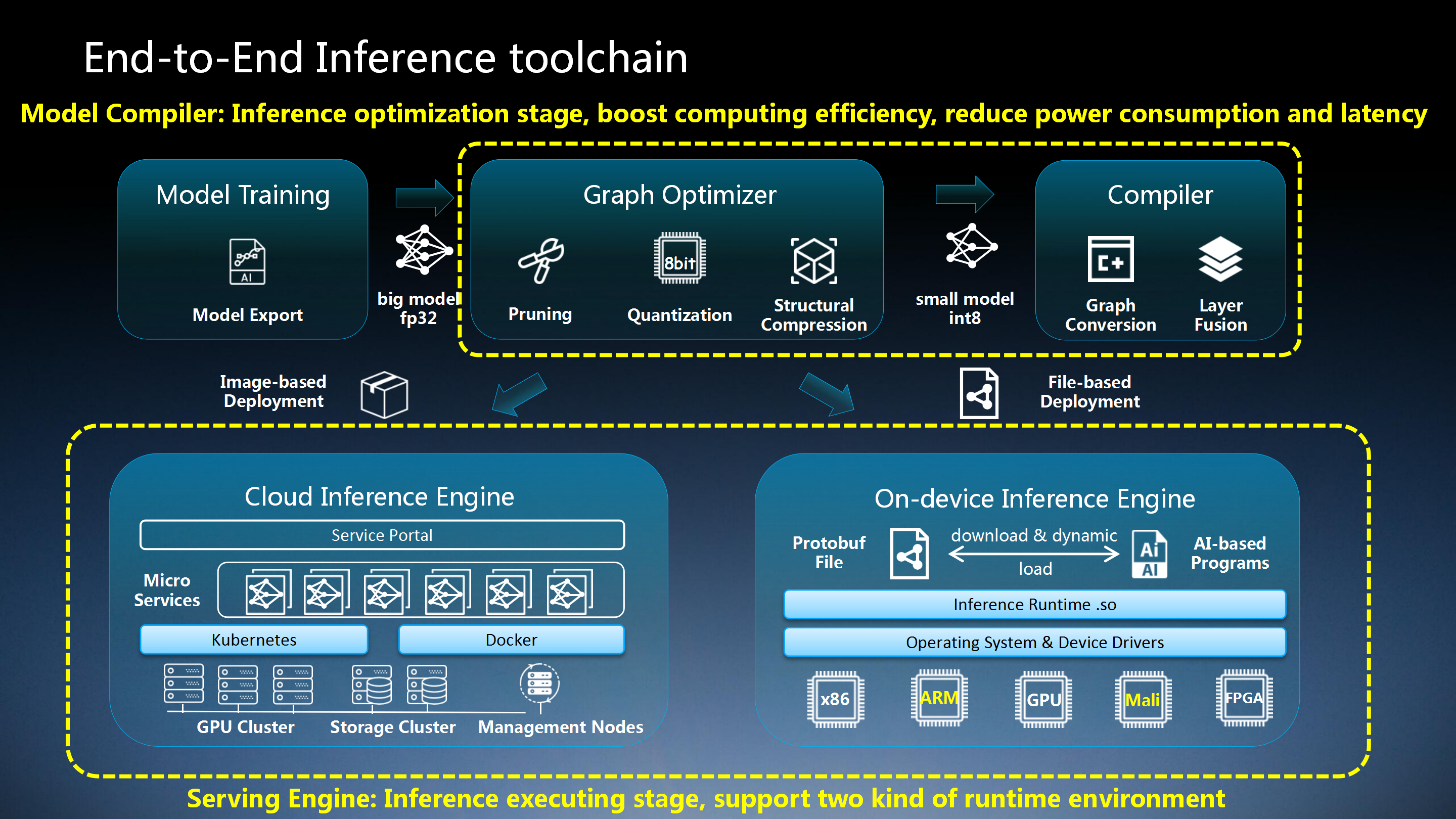Adlik is an end-to-end optimizing framework for deep learning models. The goal of Adlik is to accelerate deep learning inference process both on cloud and embedded environment.
With Adlik framework, different deep learning models can be deployed to different platforms with high performance in a much flexible and easy way.
We test the inference performance of Adlik on the same CPU or GPU using the simple cnn model (mnist model) and the resnet50 model with different runtimes. The CPU and GPU parameters used in the test are as follows:
| type | number | |
|---|---|---|
| CPU | Intel(R) Xeon(R) CPU E5-2680 v4 @ 2.40GHz | 1 |
| GPU | Tesla V100 SXM2 32GB | 1 |
| speed of client (pictures/sec) | speed of serving engine (pictures/sec) | tail latency of one picture (sec) | |
|---|---|---|---|
| keras-tf1.14 | 2200.372 | 2291.584 | 1.81E-05 |
| keras-tf2.1 | 2003.901 | 2077.644 | 1.77E-05 |
| keras-OpenVINO | 2647.344 | 2788.087 | 1.90E-05 |
| keras-TensorRT | 37342.687 | 163058.592 | 2.06E-05 |
| keras-tfGPU1.14 | 19414.208 | 52247.525 | 3.24E-05 |
| keras-tfGPU2.1 | 19395.129 | 53640.456 | 3.29E-05 |
| keras-TFLiteCPU | 778.890 | 790.150 | 1.82E-05 |
| tensorflow-tf1.14 | 1486.878 | 1531.337 | 1.95E-05 |
| tensorflow-tf2.1 | 2160.331 | 2248.311 | 1.81E-05 |
| tensorflow-tfGPU1.14 | 19043.582 | 51448.587 | 3.31E-05 |
| tensorflow-tfGPU2.1 | 19244.343 | 50705.164 | 3.22E-05 |
| tensorflow-TFLiteCPU | 3114.246 | 3250.399 | 1.34E-05 |
| pytorch-OpenVINO | 9053.677 | 10226.869 | 1.27E-05 |
| pytorch-TensorRT | 46318.234 | 249302.706 | 1.76E-05 |
Note
i. In the first column of the table, words before '-' represent different runtimes, and words after '-' represent different inference engines.
ii. The tf and OpenVINO serving engine are test in the CPU environment, and the TensorRT and tfGPU serving engine are test in the GPU environment.
iii. The test model of TensorFlow Lite is an unquantified model, and the number of threads is set to 1 during testing.
| speed of client (pictures/sec) | speed of serving engine (pictures/sec) | tail latency of one picture (sec) | |
|---|---|---|---|
| keras-tf1.14 | 3.599 | 3.640 | 0.00311 |
| keras-tf2.1 | 6.183 | 6.301 | 0.00302 |
| keras-OpenVINO | 9.359 | 9.642 | 0.00313 |
| keras-TensorRT | 237.176 | 1402.338 | 0.00350 |
| keras-tfGPU1.14 | 175.423 | 433.627 | 0.00339 |
| keras-tfGPU2.1 | 170.680 | 420.814 | 0.00348 |
| keras-TFLiteCPU | 2.838 | 2.862 | 0.00298 |
| tensorflow-tf1.14 | 3.669 | 3.711 | 0.00305 |
| tensorflow-tf2.1 | 6.554 | 6.684 | 0.00298 |
| tensorflow-tfGPU1.14 | 181.118 | 454.013 | 0.00331 |
| tensorflow-tfGPU2.1 | 176.710 | 473.091 | 0.00354 |
| tensorflow-TFLiteCPU | 2.870 | 2.895 | 0.00296 |
| pytorch-OpenVINO | 9.274 | 9.552 | 0.00313 |
| pytorch-TensorRT | 238.244 | 1332.449 | 0.00344 |
Model optimizer focuses on specific hardware and runs on it to achieve acceleration. The proposed framework mainly consists of two categories of algorithm components, i.e. pruner and quantizer.
Model compiler supports several optimizing technologies like pruning, quantization and structural compression, which can be easily used for models developed with TensorFlow, Keras, PyTorch, etc.
Serving Engine provides deep learning models with optimized runtime based on the deployment environment. Put simply, based on a deep learning model, the users of Adlik can optimize it with model compiler and then deploy it to a certain platform with Adlik serving platform.
This guide is for building Adlik on Ubuntu systems.
Then, clone Adlik and change the working directory into the source directory:
git clone https://github.com/ZTE/Adlik.git
cd Adlik-
Install the following packages:
python3-setuptoolspython3-wheel
-
Build clients:
bazel build //adlik_serving/clients/python:build_pip_package -c opt
-
Build pip package:
mkdir /tmp/pip-packages && bazel-bin/adlik_serving/clients/python/build_pip_package /tmp/pip-packages
First, install the following packages:
automakelibtbb2libtoolmakepython3-six
-
Install
intel-openvino-runtime-ubuntu<OS_VERSION>-<VERSION>package from OpenVINO. -
Assume the installation path of OpenVINO is
/opt/intel/openvino_VERSION, run the following command:export INTEL_CVSDK_DIR=/opt/intel/openvino_VERSION export InferenceEngine_DIR=$INTEL_CVSDK_DIR/deployment_tools/inference_engine/share bazel build //adlik_serving \ --config=openvino \ -c opt
Run the following command:
bazel build //adlik_serving \
--config=tensorflow-cpu \
-c optAssume builing with CUDA version 10.0.
-
Install the following packages from here and here:
cuda-cublas-dev-10-0cuda-cufft-dev-10-0cuda-cupti-10-0cuda-curand-dev-10-0cuda-cusolver-dev-10-0cuda-cusparse-dev-10-0libcudnn7=*+cuda10.0libcudnn7-dev=*+cuda10.0
-
Run the following command:
env TF_CUDA_VERSION=10.0 \ bazel build //adlik_serving \ --config=tensorflow-gpu \ -c opt \ --incompatible_use_specific_tool_files=false
Run the following command:
bazel build //adlik_serving \
--config=tensorflow-lite-cpu \
-c optAssume building with CUDA version 10.0.
-
Install the following packages from here and here:
cuda-cublas-10-0cuda-cufft-10-0cuda-cupti-10-0cuda-curand-10-0cuda-cusolver-10-0cuda-cusparse-10-0cuda-nvml-dev-10-0cuda-nvrtc-10-0libcudnn7=*+cuda10.0libcudnn7-dev=*+cuda10.0libnvinfer7=*+cuda10.0libnvinfer-dev=*+cuda10.0libnvonnxparsers7=*+cuda10.0libnvonnxparsers-dev=*+cuda10.0
-
Run the following command:
env TF_CUDA_VERSION=10.0 \ bazel build //adlik_serving \ --config=tensorrt \ -c opt \ --action_env=LIBRARY_PATH=/usr/local/cuda-10.0/lib64/stubs \ --incompatible_use_specific_tool_files=false
The ci/docker/build.sh file can be used to build a Docker images that contains all the requirements for building
Adlik. You can build Adlik with the Docker image.
Note: If you build the runtime with GPU in a Docker image, you need to add the CUDA environment variables in the Dockerfile, such as:
ENV NVIDIA_VISIBLE_DEVICES all ENV NVIDIA_DRIVER_CAPABILITIES compute, utility
The version of the service engine adlik supports.
| TensorFlow 1.14 | TensorFlow 2.1 | Openvino 2019 | Tensorrt 6 | Tensorrt 7 | |
|---|---|---|---|---|---|
| keras | ✓ | ✓ | ✓ | ✓ | ✓ |
| TensorFlow | ✓ | ✓ | ✓ | ✓ | ✓ |
| PyTorch | ✗ | ✗ | ✓ | ✓ | ✗ |
Apache License 2.0



